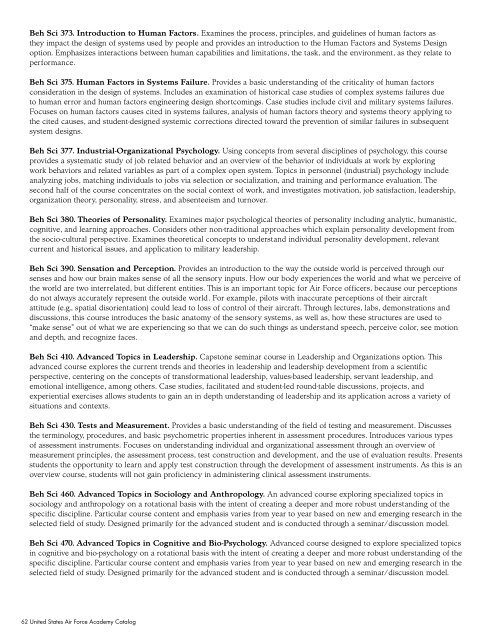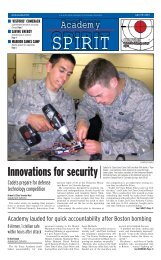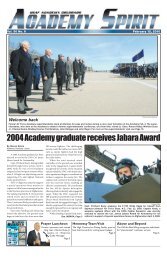2008-2009 Catalog - United States Air Force Academy
2008-2009 Catalog - United States Air Force Academy
2008-2009 Catalog - United States Air Force Academy
Create successful ePaper yourself
Turn your PDF publications into a flip-book with our unique Google optimized e-Paper software.
Beh Sci 373. Introduction to Human Factors. Examines the process, principles, and guidelines of human factors as<br />
they impact the design of systems used by people and provides an introduction to the Human Factors and Systems Design<br />
option. Emphasizes interactions between human capabilities and limitations, the task, and the environment, as they relate to<br />
performance.<br />
Beh Sci 375. Human Factors in Systems Failure. Provides a basic understanding of the criticality of human factors<br />
consideration in the design of systems. Includes an examination of historical case studies of complex systems failures due<br />
to human error and human factors engineering design shortcomings. Case studies include civil and military systems failures.<br />
Focuses on human factors causes cited in systems failures, analysis of human factors theory and systems theory applying to<br />
the cited causes, and student-designed systemic corrections directed toward the prevention of similar failures in subsequent<br />
system designs.<br />
Beh Sci 377. Industrial-Organizational Psychology. Using concepts from several disciplines of psychology, this course<br />
provides a systematic study of job related behavior and an overview of the behavior of individuals at work by exploring<br />
work behaviors and related variables as part of a complex open system. Topics in personnel (industrial) psychology include<br />
analyzing jobs, matching individuals to jobs via selection or socialization, and training and performance evaluation. The<br />
second half of the course concentrates on the social context of work, and investigates motivation, job satisfaction, leadership,<br />
organization theory, personality, stress, and absenteeism and turnover.<br />
Beh Sci 380. Theories of Personality. Examines major psychological theories of personality including analytic, humanistic,<br />
cognitive, and learning approaches. Considers other non-traditional approaches which explain personality development from<br />
the socio-cultural perspective. Examines theoretical concepts to understand individual personality development, relevant<br />
current and historical issues, and application to military leadership.<br />
Beh Sci 390. Sensation and Perception. Provides an introduction to the way the outside world is perceived through our<br />
senses and how our brain makes sense of all the sensory inputs. How our body experiences the world and what we perceive of<br />
the world are two interrelated, but different entities. This is an important topic for <strong>Air</strong> <strong>Force</strong> officers, because our perceptions<br />
do not always accurately represent the outside world. For example, pilots with inaccurate perceptions of their aircraft<br />
attitude (e.g., spatial disorientation) could lead to loss of control of their aircraft. Through lectures, labs, demonstrations and<br />
discussions, this course introduces the basic anatomy of the sensory systems, as well as, how these structures are used to<br />
“make sense” out of what we are experiencing so that we can do such things as understand speech, perceive color, see motion<br />
and depth, and recognize faces.<br />
Beh Sci 410. Advanced Topics in Leadership. Capstone seminar course in Leadership and Organizations option. This<br />
advanced course explores the current trends and theories in leadership and leadership development from a scientific<br />
perspective, centering on the concepts of transformational leadership, values-based leadership, servant leadership, and<br />
emotional intelligence, among others. Case studies, facilitated and student-led round-table discussions, projects, and<br />
experiential exercises allows students to gain an in depth understanding of leadership and its application across a variety of<br />
situations and contexts.<br />
Beh Sci 430. Tests and Measurement. Provides a basic understanding of the field of testing and measurement. Discusses<br />
the terminology, procedures, and basic psychometric properties inherent in assessment procedures. Introduces various types<br />
of assessment instruments. Focuses on understanding individual and organizational assessment through an overview of<br />
measurement principles, the assessment process, test construction and development, and the use of evaluation results. Presents<br />
students the opportunity to learn and apply test construction through the development of assessment instruments. As this is an<br />
overview course, students will not gain proficiency in administering clinical assessment instruments.<br />
Beh Sci 460. Advanced Topics in Sociology and Anthropology. An advanced course exploring specialized topics in<br />
sociology and anthropology on a rotational basis with the intent of creating a deeper and more robust understanding of the<br />
specific discipline. Particular course content and emphasis varies from year to year based on new and emerging research in the<br />
selected field of study. Designed primarily for the advanced student and is conducted through a seminar/discussion model.<br />
Beh Sci 470. Advanced Topics in Cognitive and Bio-Psychology. Advanced course designed to explore specialized topics<br />
in cognitive and bio-psychology on a rotational basis with the intent of creating a deeper and more robust understanding of the<br />
specific discipline. Particular course content and emphasis varies from year to year based on new and emerging research in the<br />
selected field of study. Designed primarily for the advanced student and is conducted through a seminar/discussion model.<br />
62 <strong>United</strong> <strong>States</strong> <strong>Air</strong> <strong>Force</strong> <strong>Academy</strong> <strong>Catalog</strong>
















